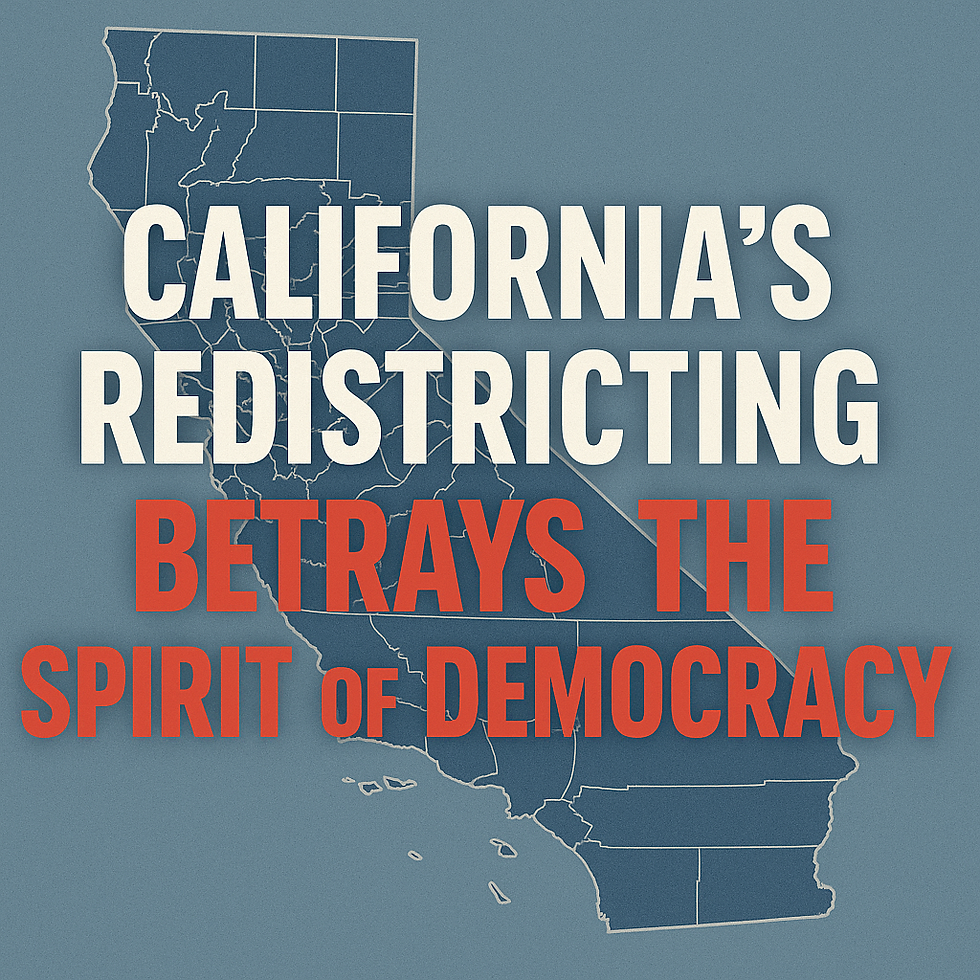Opinion: Why I Oppose California’s Redistricting Proposition 50
- mauryblackman
- Sep 25, 2025
- 3 min read
California prides itself on leading the nation in progressive reforms, yet when Proposition 50 comes before voters, it risks betraying the very democratic values we claim to uphold. This measure, which would temporarily shift congressional redistricting to the legislature, presents itself as a defense against partisan maps elsewhere, but it falls far short of genuine representation. I cannot support Proposition 50.

At its heart, Proposition 50 would replace the current maps drawn by the independent California Citizens Redistricting Commission with new maps drawn by the legislature, from 2026 until after the 2030 census. Proponents argue it is a response to aggressive redistricting in Texas and is meant to protect California’s congressional seats. But politically reactive measures are not the same as principled reform.
Democracy is not about balancing lines or crafting politically competitive districts. It is about people in real communities—sharing schools, transit systems, local economies—being able to elect a representative who understands their world. Proposition 50 prioritizes legislative control over community integrity. It risks fracturing neighborhoods, diluting shared interests, and concentrating power in state lawmakers rather than in the people they serve.
Under Proposition 50, abstract criteria like managing partisan balance or political “safety” may take precedence over keeping neighborhoods whole. A district drawn by politicians has every incentive to split communities that vote coherently, in order to protect incumbents or manufacture margins. The very purpose of independent commissions was to remove that temptation. Reverting to legislative maps undercuts the reforms we believed would prevent this kind of manipulation.
Critics often compare Proposition 50 to the blatant gerrymandering in Texas, and it’s true that Texas’s maps are more overt in their bias. Texas lawmakers openly engineer districts to entrench one party’s advantage, cracking and packing communities of color to weaken their influence. That is monstrous and must be opposed. But Proposition 50 is a kind of stealth gerrymander: it presents itself as defense while enacting the same logic—just more quietly and with less accountability.
In Texas, the harm is visible. Voters know maps were drawn to keep power. In California under Proposition 50, harm would be hidden under the banner of “defending democracy.” That makes it more dangerous. Californians may believe their maps are fair while their neighborhoods are quietly split apart. Quiet harm disguised as reform is harder to resist.
Which is more outrageous? The honest cynicism of Texas, or the false virtue of Proposition 50? The latter, because it invites complacency. It suggests California is simply responding rather than failing. It encourages us to accept legislative control in the name of counterbalancing a perceived threat. But two wrongs don’t make a right. We should not adopt a flawed mechanism because someone else’s is worse.
If Proposition 50 passes, the negative consequences would be profound. Communities of interest would be marginalized. Voters in unified neighborhoods could find themselves represented by multiple members of Congress whose incentives do not align with local priorities. Accountability would become more diffuse. The very trust in our electoral system would erode, even as proponents claim they are defending it.
California should not settle for a redistricting system that reacts to politics rather than transcends them. Our state has the civic capacity, progressive spirit, and institutional maturity to demand something higher—and more consistent with democratic ideals. Real reform begins with the communities themselves, not the interests of parties or legislators.
Democracy is not a political battlefield. It is a covenant among neighbors. Proposition 50 fails that covenant. I urge Californians to reject it. We must insist instead on a system that truly reflects the communities we live in, and ensures that our neighbors’ voices are not carved away but kept intact. Anything less is a betrayal of California’s promise.



Comments